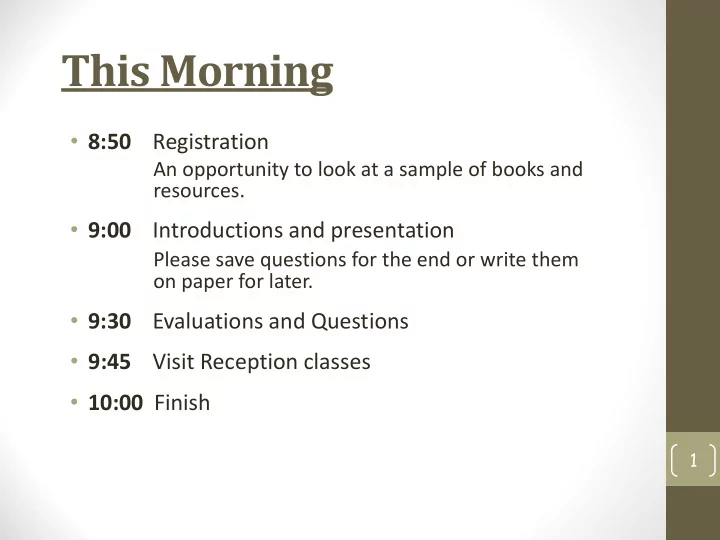

This Morning • 8:50 Registration An opportunity to look at a sample of books and resources. • 9:00 Introductions and presentation Please save questions for the end or write them on paper for later. • 9:30 Evaluations and Questions • 9:45 Visit Reception classes • 10:00 Finish 1
Supporting your C hild’s Maths Learning at Home Wednesday 13 th June 2018 Imandeep Atwal, Maths Leader 2 Kim Peterson, EYFS Leader
This session aims to give you… • An understanding of the complexity of the skills involved in early mathematical concepts • An overview of the progression of skills • An insight into how we teach mathematical skills at Sherington to enable you to support this learning at home • An understanding of how important the partnership between parents, carers and teachers is • An understanding of Maths expectations going 3 into Year 1
Food for Thought ‘If parents want to give their children a gift, the best thing they can do is to teach their children to love challenges, be intrigued by mistakes, enjoy effort, and keep on learning.’ ‘Good mathematics is not about how many answers you know … it’s how you behave when you don’t know.’ 4
Maths Rich Talk & Play! Observation, handling, listening and talking are a child’s introduction to mathematical concepts. Activities such as singing songs, games, role play, cooking and shopping with your child help to develop their understanding of our number 5 system and wider mathematical concepts. EYE: I can count to 20
An Example Two children are at a fair. One says, ‘Look! There are clowns.’ ‘And there are three horses!’ exclaims the other. Some children might describe them by colour, a black horse, a brown and a grey horse. The second child sees the same colours, but also sees the quantity - three horses. The second child is having a mathematical experience. 6
Maths in Reception is split into two areas… Number Space, Shape and Measure 7
Measures: Length / Capacity / Weight & Mass Rec EYE: I can order objects by how long they are; Rec EYE: I can use words to describe how full a container is; Rec EYE: I can order objects by how heavy they are Year 1 EYE: I can measure length, mass & capacity Year 1 EYE: I can describe comparisons using correct vocabulary 8
Space & 2D & 3D shapes Rec EYE: I can name cubes, cuboids and spheres Rec EYE: I can name squares, rectangles, triangles and circles Year 1 EYE: I can recognise and name cubes, cuboids and spheres Year 1 EYE: I can recognise and name squares, rectangles, triangles and spheres • Cube • Cuboid • Sphere • Cylinder 9 • Pyramid EYE: I can say where an object is, using the correct vocabulary; EYE: I can name some 2D and 3D shapes
Measures: Time Rec EYE: I use time related vocabulary including o’clock Rec EYE: I know the days of the week and months of the year Year 1 EYE: I can tell the time to the hour and half past the hour Year 1 EYE: I can draw hands on a clock face to show o’clock and half past the hour Year 1 EYE: I can name the days of the week and months of the year 10
Number • Concrete – hands on resources are vital for understanding at all ages when a new concept is introduced • Pictorial • Abstract 11 • 4 + 2 = 6
Place Value • In reception, they have learnt the numbers up to 20; looking at how a number can be represented in different ways. • Year 1: - know spellings of numbers up to 20 - recognise numbers up to 100 in numerals - count forwards and backwards up to 100 12
Addition & Subtraction • In reception, they have been exposed to problems by using practical resources • In year 1, they will continue to explore this before being exposed to the abstract method • +, – and = go last 13
In depth learning • Children need the opportunity to problem solve and develop in depth learning within their EYE • How many ways can we make 20? NOT counting past 20. 14
Remember! • Pencil grip – start with, and encourage the correct grip 15
Remember! • Number formation – incorrectly formed numbers are difficult to correct once established • Digit reversal is not uncommon in early recording of number • Also starting in the incorrect place 16
Books that support mathematical concepts can be books about number … or not. Remember the 3 horses. 17
Helping your child with maths at home… 18
Food for Thought ‘If parents want to give their children a gift, the best thing they can do is to teach their children to love challenges, be intrigued by mistakes, enjoy effort, and keep on learning.’ ‘Good mathematics is not about how many answers you know … it’s how you behave when you don’t know.’ 19
Evaluations • Please fill in and return your evaluation • Questions • Classroom visits 20
Recommend
More recommend